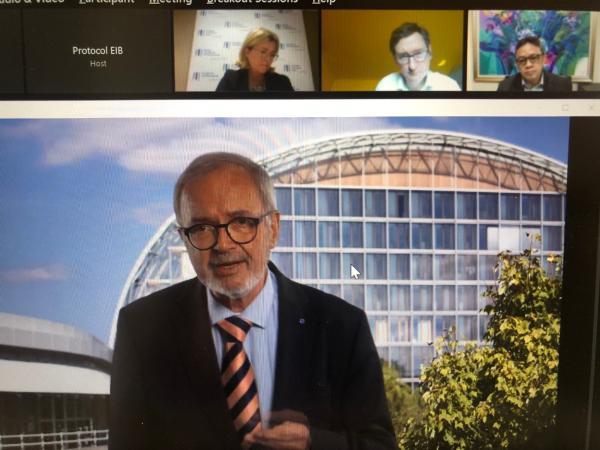
The role of sustainable bonds in delivering the Sustainable Development Goals was the subject of a digital UNDP-EIB event The Sustainable Development Goals and Bonds – Working together for Impact which saw a special focus on the needs of emerging markets. Senior representatives from the Indonesian and Uzbek Finance Ministries joined UNDP Administrator Achim Steiner, EIB President Werner Hoyer, Vice President Ambroise Fayolle as well as Head of EIB Capital Markets Eila Kreivi and Maria Shaw-Barragan Head of EIB Global Partners for the wide ranging discussion.
The presence of USD 329 trillions of financial assets on the markets, of which only 1% would be needed to achieve SDGs with an immense return for all parties, was emphasized by Achim Steiner who kicked off the event. He also highlighted the importance of the EIB-UNDP partnership, whose Memorandum of Understanding has recently been renewed for another 5 years: “Together we are helping to spur a game-changing SDG investment push. This help will ensure that every country and every community can play its part in shaping global, inclusive, and green recovery and ultimately economy,“ he said.
President Hoyer underscored the importance of joint EIB-UNDP action and pointed out the green, social and sustainability bond market has grown impressively in the last five years, and is about to break another record year of issuance to reach almost USD 2 trillion in outstanding bonds. He said, “Our joint effort will support countries to close the SDG financing gap by unlocking new types of debt instruments and promote transparency in sustainable financing.”
In a panel debate which followed, Luky Alfirman, Director General of Budgeting Financing and Risk Management at Indonesia’s Ministry of Finance shared how UNDP Indonesia had supported the country’s SDG Bonds journey, “From climate budget tagging and formulating the green framework , to impact reporting , having the UNDP as a neutral expert from the beginning to the end of Indonesia’s thematic bond issuance journey was very helpful.“
Jasur Karshibaev, Director of the Debt Management Office at the Ministry of Finance at the Republic of Uzbekistan, explained how sustainable bonds can help governments to achieve the SDGs. He said, “In the process of issuing SDG bonds, Uzbekistan introduced results-orientated budgeting, supported by UNDP which enabled us with capacity building, ensuring transparency, and revisiting the prioritization of budget allocation based on the SDG’s.”
A key theme in the discussion was how these kinds of bonds can help structure a green and just transition both within the developed and developing world as all projects invested into, need to be Paris-aligned and follow agreed standards.The Head of EIB Capital Markets Eila Kreivi highlighted the important work on standards and criteria carried out by the EIB and its partners to ensure the transparency and accountability of sustainable bonds and Green Bonds in particular. As she put it succinctly, “The Green and SDG Bonds are not an end in themselves, it’s what you do with the money that matters“
Vice-President Ambroise Fayolle, responsible for climate action and development at the EIB, highlighted the role of projects and investments in supporting climate adaptation, in order to help those countries where the effect of climate change effects are being felt. He anticipated the announcement at COP26 in Glasgow of the EIB’s new Adaptation Plan. He also acknowledged the flourishing of Green Bonds’ demand and the need to support emerging markets in their efforts.
Stressing the importance of partnerships and working on common priorities, the EIB’s Director of Global Partners Maria Shaw Barragan described a recent Team Europe mission to support the delivery and production of vaccines as well as clean water in Cote D’Ivoire and Burkina Faso. She stressed that the pandemic had set back the delivery of the SDGs and that the urgency and importance of joint action is even greater than before to get the finance into projects.

